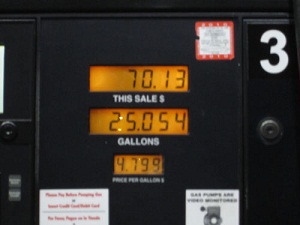Do rising gas prices help or hurt solar industry?
 Gasoline prices are rising again and may approach $4 a gallon at the pump in 2011—and $5 a gallon in 2012. The rising costs of gasoline could hamper, if not wipe out the economic recovery.
Gasoline prices are rising again and may approach $4 a gallon at the pump in 2011—and $5 a gallon in 2012. The rising costs of gasoline could hamper, if not wipe out the economic recovery.
While gasoline doesn’t often compete directly with the solar energy market, it does have an indirect effect of increasing interest in solar power and could provide a significant boost, said industry analysts.
Analysts at investment companies like Morgan Stanley, Goldman Sachs Group Inc. and Merrill Lynch projected that oil prices in 2011 are likely to rise to $100 a barrel. The rise in oil costs is affecting gas prices. GasBuddy.com’s Patick DeHaan projected gasoline prices will reach $3.08 per gallon, on average, in the week of Jan. 10, and could climb up $4 in the spring or summer.
While solar isn’t in direct competition with gasoline, it could provide a boost for the industry.
“Solar doesn’t compete with gasoline at the pump,” said Pavel Molchanov, Raymond James vice president and equity research analyst. But, “As people see rising gas prices, solar seems to be psychologically more appealing.”
Shayle Kann, GTM Research managing director of solar research, agreed that gasoline prices don’t have a direct impact on the solar industry, but that there is a connection.
“I think there’s an element of public sentiment that comes into play,” he said. “What’s happening in the oil industry makes us realize how highly dependent we are on imports.”
Kann said the increase in oil and gasoline prices certainly helps the renewable energy industry as a whole.
Kann does see another indirect impact on the solar market. “Increasing oil prices will probably speed up the adoption of electric vehicles. And an increase in electric vehicles is a positive for solar,” he said.
Electric cars can be charged at solar-powered charging stations. Already numerous manufacturers have developed and installed solar-powered car charging stations.
Lux Research analyst Jason Eckstein said rising oil prices will have more of an impact on the solar industry in countries that use petroleum for power generation, like Cyprus and Bulgaria.
He said those countries have plenty of incentives to encourage growth in the solar industry.
According to Eckstein, The rising cost of gasoline won’t be a direct boost to the solar market in the U.S. because solar doesn’t actually offset gas.
Aggressive state incentives will likely give the biggest boost to solar—that or a rise in the cost of natural gas.
“If natural gas prices were increasing significantly in any way, that would make solar directly more attractive in the U.S.”
Since most of the U.S.’s electric needs are met by natural gas and coal-fired power plants, if natural gas prices started to rise, there would be a more dramatic impact to the solar industry.
Natural gas is cheap right now and likely to remain so.
“I don’t think any of us are seeing a rise in natural gas in the near future,” said Molchanov.
But, for now, be prepared to pay a lot more at the pump.
Pictured: Don't worry, the gas price in this pic was manipulated. Things aren't this bad...yet.



